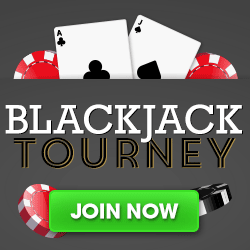Kentucky Launches Regulated Sports Betting Market with a Bang
House of Edges: Triple Criteria, Stockdale Paradox and Surviving the Cut [Strategic Guide to House Edge] (Part One)
June 26, 2019 Dejan Gavrilovic
![House of Edges: Triple Criteria, Stockdale Paradox and Surviving the Cut [Strategic Guide to House Edge] (Part One)](/wp-content/s/2019/06/house_of_edges_triple_criteria_stockdale_paradox_and.jpg?x81710)
There is a saying victory is the improved reality. Expanding it, an argument can be made, then, a total victory is the altered reality. Win upgrades our way of life; a triumph creates a new realm of existence. Ask any Olympic gold medalist or the Stanley Cup champion, a competitive Type-A personality top CEO or a knight holding a saved princess in his arms, for that matter. Same can be said of defeat; unavoidable one worsens our situation but an overwhelming rout deteriorates everything on its path in shattering fashion. Such interpolating relations between wins and losses, their absolute forms and extremes are present in any walk of life, often or not. In games of chances and choices, they come with the territory.
Now, human endeavours create different battlefields every day. Locations vary depending on a number of factors: personal, professional, social, political, racial, lovers’ ones or any other. Victors in wars — waging them by default to improve or change their reality, often groundless and with insurmountable loss of human life — cite various places they’ve encountered their foe before endgame had its say.
When it comes to gambling, all encounters happen just at one place — in the house of edges.
It’s a monumental structure, be it a land-based or online casino, racetrack or sportsbook, private t or any other place. We’re not talking about architecture or decoration attributes but peculiar, sometimes even idiosyncratic yet colossal segments conditioning games we play.
This house has so many edges — smooth, coarse, sharp, blunt, gooey, slippery, bevelled, bullnose, angled — it often takes us ages to master them all. Although instruction manuals and treasure maps, knowledge and resources, hints and tips, are nowadays available like never before, it’s still difficult to slalom them all unscathed.
The most dangerous edge of all, a particularly devious one, resides right on the house doorstep.
Patrons entering the opportunity dome of gambling often by not noticing it properly, on occasions even neglecting its essential importance to the outcome of games.
In a way, it’s understandable; how many of us can recall the shape of entry door leading to a great club party? ‘Buddy, I was so excited about what lays behind, just wanted to be at the party — I have no idea how doorway looked at all! Wooden, steel, what difference does it make?’
Test of Triple Criteria
Well, when it comes to this one — of course, you’ve guessed it, we’re talking about the house edge — it makes all the difference in the gamblers’ world.
 To illustrate our common approach to default casino advantage, as well as to set a building block in this two-part strategic guide for a better evaluation of the house edge, we’ll pay a short visit to the anecdote from Ancient Greece.
To illustrate our common approach to default casino advantage, as well as to set a building block in this two-part strategic guide for a better evaluation of the house edge, we’ll pay a short visit to the anecdote from Ancient Greece.
It’s only fitting, considering Hellenic culture is actually the European cradle of gambling. Form the high-stakes games between Zeus, Poseidon, Hades, and Athena, to the Trojan War and Homer, upper social classes, the peasants and slaves, ancient Greeks were spectacular gamblers. They even had special places designed for gambling (mind you, B.C. time) although games were condemned by most authors and philosophers, even banned by authorities, but to no avail.
Socrates (470-399 B.C.), a classical philosopher widely recognized as one of the few who changed the way philosophy is professed, was credited in Athens a moral person who valued knowledge. One day, as he was walking in the park, an acquaintance (or a student, depending on the version of the story) approached him.
- “Do you know what I just heard about your best friend?”
- “Wait for a second,” Socrates replied amused by development. “Before you say anything, I would like to conduct a test of triple criteria.”
- “Triple criteria?”
- “Yes. Before you even start talking about my best friend, I would like to see whether your story meets certain standards. The first one is the criteria of truth: are you sure what you want to tell me is the fact?”
- “Well, no, actually, I’ve just heard it, haven’t seen it, and…”
- “All right,” Socrates interrupted. “So you don’t know is it true or not? Very well. Let’s see the second criteria of goodness: is what you’re trying to tell me about my best friend anything good?
- “No, it isn’t. On the contrary, it is a rather…”
- “So, you want to tell me something bad about him and you’re not even sure it’s true,” Socrates continued. “All right, then. You may still the test on the third criteria of the benefit: will what you’re trying to say benefit me at all?”
- “Frankly, not exactly, but…”
- “If that is the case, you’re trying to tell me something about my best friend and you don’t know whether it’s true or not, it’s nothing good, and it can be of no use to me. Why would you tell me such a thing in the first place?”
Finishing his moral lesson on a high note, Socrates walked away, continuing his stroll.
As this story shows why he was such a thought leader and respected person in Athens, it explains why Socrates never learned his best friend was shagging his younger wife, Xanthippe.
The Stockdale Paradox of House Edge
The story also provides us with a quite useful tool to evaluate the house edge residing on the doorstep of every casino game, and finally, shows how sometimes we neglect to focus on things we assumingly consider not truthful, good, or useful.
 A simple gambling matter of a fact is — to fully understand the house edge, its true works, and how it should be used is of paramount importance to any gambler, from aspiring or social players to professionals.
A simple gambling matter of a fact is — to fully understand the house edge, its true works, and how it should be used is of paramount importance to any gambler, from aspiring or social players to professionals.
In a way, it’s more important than skills or luck. Why? Because…
We are much more optimistic creatures than we’d love to it; we often believe more in positive outcomes than in logic of reality itself.
When we evaluate the house edge of any game, sometimes we just misinterpret the data. It’s only natural. The reason behind is called the Stockdale Paradox.
Invented by iral Jim Stockdale, naval aviator, the Medal of Honor recipient, and the highest-ranking U.S. prisoner of war during the Vietnam War (he spent eight years in Hanoi Hilton), his approach is further elaborated by Jim Collins in a book Good to Great.
In a nutshell, as iral Stockdale put it, “you must never confuse faith that you will prevail in the end — which you can never afford to lose — with the discipline to confront the most brutal facts of your current reality, whatever they might be.”
(That may sound like quite a counterintuitive balancing. Let it sink in for a while as we proceed. After years of practice, the only thing left to be said about the Stockdale Paradox is — it’s true, it’s good, it will be highly beneficial to you.)
Now…
The house edge is one of the most brutal casino reality facts.
Patrons’ expertise and maturity, the influx of luck, the games’ rules, and players’ preferences in games’ selection — they all take the second row compared to the house edge. It is the most important, even decisive factor when it comes to returns on gambling investments.
Yet again, on occasion, we tend to confuse our faith in a positive outcome with the discipline as we confront the house edge reality.
For instance, the house edge is usually defined as the built-in advantage of the casino over the player. Representing their profit in the form of a percentage of players’ bet, the house edge makes games weighted in favour of casinos in the long run. In turn, this coefficient defines what might come back as a potential return to the player.
In other words, gambling dens’ insurance to beating players is in the odds stacked in their favour.
Thus, when you see roulette house edge of 5.26% on American wheels — or 2.70% on single-zero European wheels; better odds comes courtesy of 37 pockets compared to double-zero wheels in the U.S. with 38 pockets — you assume that, on average, every $100 bet will see the casino keep $5.26 while $94.74 are for grabs.
That is simply not the case: the house edge is much, much more.
Furnished with remarkable legacy and knowledgeable history lessons, we shall see what the house edge is all about in Part Two. What is the impact of time in this mathematical equation? Does the house edge apply to initial wager or total money involved in gambling session? What about rules and strategy, do they impact the house edge? Let’s roll.






















